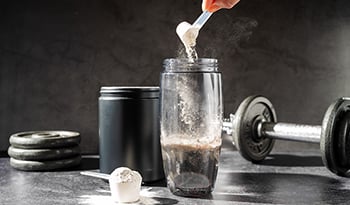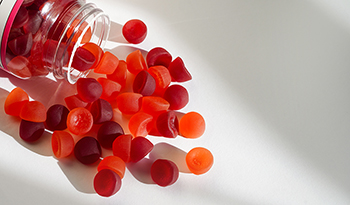Best Sports Supplements of 2023 that Boost Athletic Performance

Discover the keys to optimizing athletic performance with evidence-based ergogenic aids. This blog provides trusted guidelines for selecting evidence-based nutritional supplements to boost energy, endurance, and overall athletic performance, from creatine monohydrate to nitrates, beta-alanine, and more.
Let’s Talk About Sports Supplements
In athletics and performance, everyone wants an edge to feel more energized, push one more rep, or win one more match—or even the advantage to win the "you vs. you" battle in the gym. Beyond sticking to a quality strength and conditioning regimen, high-performing athletes must support their metabolic health and performance to gain an edge effectively.
We call supplements that help improve athletic performance "ergogenic aids." This blog will examine some of the top safe, evidence-based ergogenic aids that optimize physical and athletic performance.
We must first acknowledge that the sports supplement world is murky at best. Before putting anything in your body, you need to understand which supplements and performance claims you can trust. Since there are more brands than any doctor, trainer, coach, or athlete could keep up with, we will start with a simple definition and some basic "supplement vetting" guidelines.
What Is a Sports Performance Supplement, and How Do I Pick One?
A sports performance supplement is often formally and scientifically called an "ergogenic aid." What's an ergogenic aid? It’s a term for substances, techniques, or practices that can improve physical performance or enhance training effects. Ergogenic aids help boost exercise performance or promote long-term improvements in strength, endurance, or other aspects of fitness. That last sentence is critical. We want evidence that the supplement improves our physical performance.
Knowing which brands or products are effective and worth taking is crucial to choosing a nutritional supplement—especially in the sports and performance world. When chatting with my patients and athletes, I recommend following these three steps:
- Look for trusted certifications: When choosing a nutritional supplement, always check for reputable certifications like USP (United States Pharmacopeia), NSF (National Sanitation Foundation), and GMP (Good Manufacturing Practices). These certifications ensure the product meets stringent quality and safety standards and should be on the supplement label or the company's website.
- Check for third-party testing: Ensure the supplement undergoes third-party testing by independent laboratories. This step confirms that the product contains the ingredients it claims to have and is free of harmful contaminants. Both USP and NSF certifications require rigorous testing, providing you with added confidence in the supplement's quality.
- Research the company's reputation: Investigate the supplement company's track record and reputation. Look for reviews and feedback from other customers to gauge their experiences with the products and the company's customer service. A reliable company will be transparent about its manufacturing processes and sourcing of ingredients.
*A special note for competing athletes—you will want to look for "NSF for Sport" on the label. NSF (National Sanitation Foundation) supplements focus on general health and safety standards. In contrast, NSF Certified for Sport supplements specifically meet additional criteria to ensure they are free of banned substances and safe for use by athletes and competitive sports participants.
Best Ergogenic Aids of 2023
The following supplements have the strongest evidence for improving athletic performance with solid safety profiles. You're likely to receive a benefit with little-to-no risk of side effects. The rather unsexy but robust list includes:
1. Creatine Monohydrate
Creatine monohydrate is one of the most well-studied and safest ergogenic supplements next to caffeine. Almost every myth you've ever heard about creatine is wrong, starting with the fact that it's biochemically not even close to a steroid—it is composed of three amino acids (L-arginine, glycine, and methionine).
Creatine works by increasing the cellular pool of phosphocreatine, which helps recycle adenosine diphosphate (ADP) back into adenosine triphosphate (ATP), the primary energy source for high-intensity exercise. As a result, creatine supplementation provides notable benefits in strength and power output during resistance exercise, and it may modestly increase lean mass when used alongside workouts.1
Additionally, research suggests creatine may reduce mental fatigue during demanding cognitive tasks and improve working memory, especially in individuals with lower creatine levels, like vegetarians and older adults. However, further studies are needed to establish its cognitive benefits fully.1
Be aware that a loading dose of creatine is only necessary if you require a specific level of muscle creatine within 30 days. Higher doses, like those needed for "loading," can cause nausea or diarrhea in some individuals. Most people will benefit from a simple 3 to 5 grams daily dose.
*Weight-sensitive athletes (e.g., wrestling/MMA) should be aware that starting creatine can lead to a slight increase in weight due to water retention in the muscles.
2. Nitrates
Nitrates in foods like beetroot and leafy green vegetables convert into nitric oxide (NO) during exercise, providing numerous performance benefits. These include improved aerobic and anaerobic endurance, increased power output, better blood flow, and enhanced muscle recovery between exercises.2
Consider incorporating beetroot juice or powder into a pre-workout meal to benefit from nitrates. However, eating too many cruciferous vegetables (e.g., cabbage, collard greens, kale) can impact thyroid hormone production due to their goitrogen content. If you have thyroid concerns, balance your consumption of beetroot juice or powder with iodine-rich foods or supplements.
It's worth noting that well-trained individuals may experience less significant performance improvement from nitrate supplementation, as their bodies already produce nitric oxide efficiently. Dosing guidelines recommend 6.4 to 12.8 milligrams of nitrates per kilogram of body weight.
3. Protein
Protein is essential for athletic performance, providing amino acids necessary for rebuilding muscle fibers and aiding muscle growth. Whey and casein protein powders, derived from milk protein, are popular (and cost-effective) options for quick and slow digestion, respectively. Alternatives like whey protein isolates (low in lactose) or plant-based proteins like soy or pea-rice blends are available for people with lactose intolerance or vegan diets.
The recommended protein intake varies based on individuals’ activity levels and goals. Still, consuming 0.7 to 1.0 grams of protein per pound of body weight daily is generally recommended to support muscle protein synthesis and overall performance. Protein intake post-exercise is particularly important for optimal muscle recovery and growth. Aim to consume most of your daily protein from whole foods and limit supplemental protein to no more than 60 grams (around 2 to 3 scoops) daily.
4. Sugars and Carbohydrates
Sugars and carbohydrates are vital for athletic performance, as they provide quick energy for muscles and enhance blood flow and nitric oxide effects, contributing to peak physical performance. They are particularly beneficial for anaerobic exercises like weightlifting or sprints and extended endurance events like marathons.
Optimal timing and amount of carbohydrate intake vary based on exercise duration and intensity. For workouts lasting 45 minutes to two hours, aim for 30 to 60 grams of carbohydrates per hour; for more extended exercises, target 60 to 90 grams of carbohydrates per hour. Carbohydrate-rich meals before training reduce the need for sugary drinks during the workout, and post-exercise intake of high-GI foods—1.0 to 1.2 grams per kilogram per hour—helps maximize glycogen resynthesis, which is crucial for those engaging in multiple daily workouts.
Please remember that fancy carbohydrate timing is likely unnecessary for the recreational athlete or exerciser. These specific dosages and timings are intended for elite-to-professional endurance and power athletes.
Additional Ergogenic Aids
Research suggests the following supplements either work well in specific contexts or consistently work moderately well. Here we're talking about:
- Beta-alanine
- Caffeine + L-theanine
- Branched-chain amino acids (BCAAS)
Beta-Alanine
Beta-alanine is a non-essential amino acid that, when combined with histidine, creates carnosine. Carnosine acts as a buffer for lactic acid during exercise, delaying muscle fatigue and improving endurance. Beta-alanine is a well-studied ergogenic aid consistently shown to increase endurance exercise performance in bouts lasting between one to 10 minutes.3
Athletes engaged in intense exercises lasting between one to four minutes, like combat-sport athletes or high-intensity interval trainers, can benefit the most from β-alanine supplementation. The advantage gained is relatively small—about 2% to 3% on average—but it can make a difference in competitive scenarios. However, for individuals focused on muscle gain or fat loss, β-alanine may not significantly affect body composition, making it a secondary option compared to other supplements like creatine and whey protein.
The recommended dosage is 3 to 6.5 grams daily, and it may take up to four weeks to experience the full effects. A common side effect of β-alanine is paresthesia, a "pins and needles” tingling sensation. Paresthesia can be minimized by dividing the daily doses or using time-release formulations. The paresthesia from supplementation is harmless but can be uncomfortable.
Caffeine with L-theanine
Caffeine with L-theanine is a combination that can enhance athletic performance. Caffeine blocks specific receptors (i.e., adenosine receptors) in the brain, boosting focus, endurance, and power output.4 However, with regular use, tolerance can develop, leading to dependence and withdrawal symptoms. Theanine, conversely, balances caffeine by reducing overexcitability without diminishing its stimulating effects, resulting in improved concentration.5
Taking 100 to 200 milligrams of caffeine with an equal dose of theanine before exercise can effectively boost aerobic performance. For anaerobic (i.e., explosive) performance, 400 to 600 milligrams of caffeine with 300 milligrams of theanine half an hour before a strenuous workout, no more than twice a week, may be beneficial.
For most people, the most straightforward application of this recommendation is to supplement with theanine and a cup of coffee before your workout. Caffeine can interact with medications and cause increased heart rate, blood pressure, and urination, so use it in moderation. Stop consuming caffeine by noon to avoid disrupting sleep—you cannot "out supplement" poor sleep quality.
Branched-Chain Amino Acids (BCAAs)
Branched-chain amino acids (BCAAs) are essential amino acids that play a role in muscle protein synthesis. They are found in protein-rich foods. While BCAA supplementation may not have significant overall benefits for exercise performance, it has been shown to reduce cognitive fatigue during prolonged exercise, making it potentially useful for athletes needing to maintain focus and coordination during long games.6
BCAAs are less likely to cause cramping or nausea when consumed before exercise compared to protein powders. Taking 10 to 20 grams of BCAAs in water or a sugary drink before training is the suggested dosage, with a typical ratio of 2:1:1 (leucine:isoleucine:valine) based on limited studies, although the ideal balance remains uncertain. Remember that context matters, so BCAA supplementation may offer minimal additional benefits for those already consuming sufficient protein.
Foundational Supplements
While the following supplements are not ergogenic aids, they are foundational for maintaining overall health, which ultimately impacts physical recovery and athletic performance.
Takeaway
Optimizing athletic performance with supplements requires careful consideration and research. While the sports supplement world can be overwhelming and untrustworthy, sticking to reputable brands with trusted certifications and third-party testing can help ensure safety and effectiveness.
- Creatine monohydrate, nitrates, protein, and sugars/carbohydrates stand out among the top evidence-based ergogenic aids for their performance-enhancing benefits with minimal risks.
- Supplements like beta-alanine, caffeine with L-theanine, and BCAAs can provide context-dependent advantages for those seeking an extra edge.
- A quality multivitamin, fish oil, and vitamin D can act as "nutritional insurance policies" if your diet isn’t always ideal or you live in a northern climate with limited access to sunlight.
Remember that individual goals, schedules, medical conditions, and other factors play a significant role in determining an optimal supplement regimen. Consult a healthcare professional or registered dietitian knowledgeable in sports nutrition who can help you make informed choices and ensure any new supplements are safe for you.
You can maximize your physical and athletic potential by combining your training and competition with well-chosen nutritional supplements.
Happy training and competition, folks!
References:
- Kreider RB, Kalman DS, Antonio J, et al. International Society of Sports Nutrition position stand: safety and efficacy of creatine supplementation in exercise, sport, and medicine. J Int Soc Sports Nutr. 2017;14(1).
- Domínguez R, Maté-Muñoz JL, Cuenca E, et al. Effects of beetroot juice supplementation on intermittent high-intensity exercise efforts. J Int Soc Sports Nutr. 2018;15(1).
- Trexler ET, Smith-Ryan AE, Stout JR, et al. International society of sports nutrition position stand: Beta-Alanine. J Int Soc Sports Nutr. 2015;12(1).
- Guest NS, VanDusseldorp TA, Nelson MT, et al. International society of sports nutrition position stand: caffeine and exercise performance. J Int Soc Sports Nutr. 2021;18(1):1.
- Anas Sohail A, Ortiz F, Varghese T, et al. The Cognitive-Enhancing Outcomes of Caffeine and L-theanine: A Systematic Review. Cureus. 2021;13(12).
- Chen IF, Wu HJ, Chen CY, Chou KM, Chang CK. Branched-chain amino acids, arginine, citrulline alleviate central fatigue after 3 simulated matches in taekwondo athletes: a randomized controlled trial. J Int Soc Sports Nutr. 2016;13(1).
DISCLAIMER:This Wellness Hub does not intend to provide diagnosis...
















































































 Table of Contents
Table of Contents
















